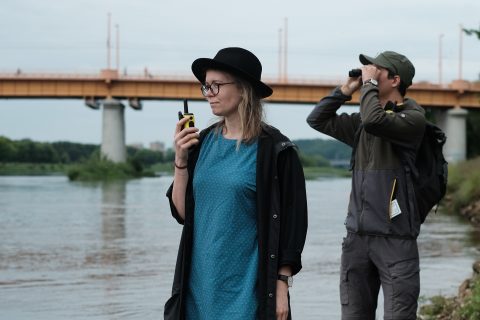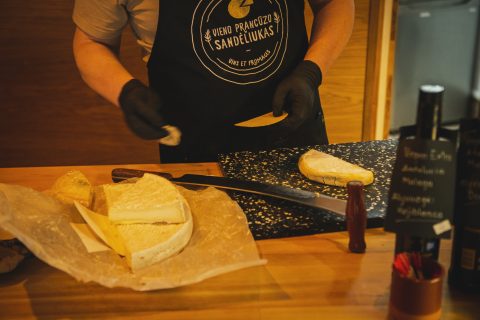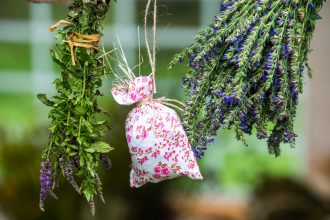Perfumer Eglė Jonaitytė is convinced that scents help us to know ourselves better and experience the world more deeply. This is also reflected in the concept of her botanical perfumes. Next to the scents created by this Kaunas resident, you can find texts and paintings inspired by scents. Basically, her work can be described as a unique poetry of scents and a synergy of arts. Eglė and I talked about how perfumes can help show who the person really is, what motivated her to create for Kaunas – of the past and present – about dedicated scents and the most fragrant places in the city.
Could you tell us what brought you to the world of perfumery?
I stumbled into it by accident. Before that, I tried a lot of activities and felt good everywhere. It was like everything I did went well for me. However, after a while, things seemed to have been exhausted and I felt that that specific activity did not provide a sense of discovery, passion and adventure. After one perfumery seminar with a wonderful teacher, who looked at perfumes from various angles – not only aesthetically but also from the spiritual, sensory and psychological point of view – I realized that I am particularly interested in this field. That night I felt my heart open, and I sobbed through the night with an incomprehensible feeling while holding a bottle of botanical perfume in my hands. It was as if the feelings of the whole world washed over my body. I immediately felt that I am going to be good in this area. It is so strange and interesting at the same time.
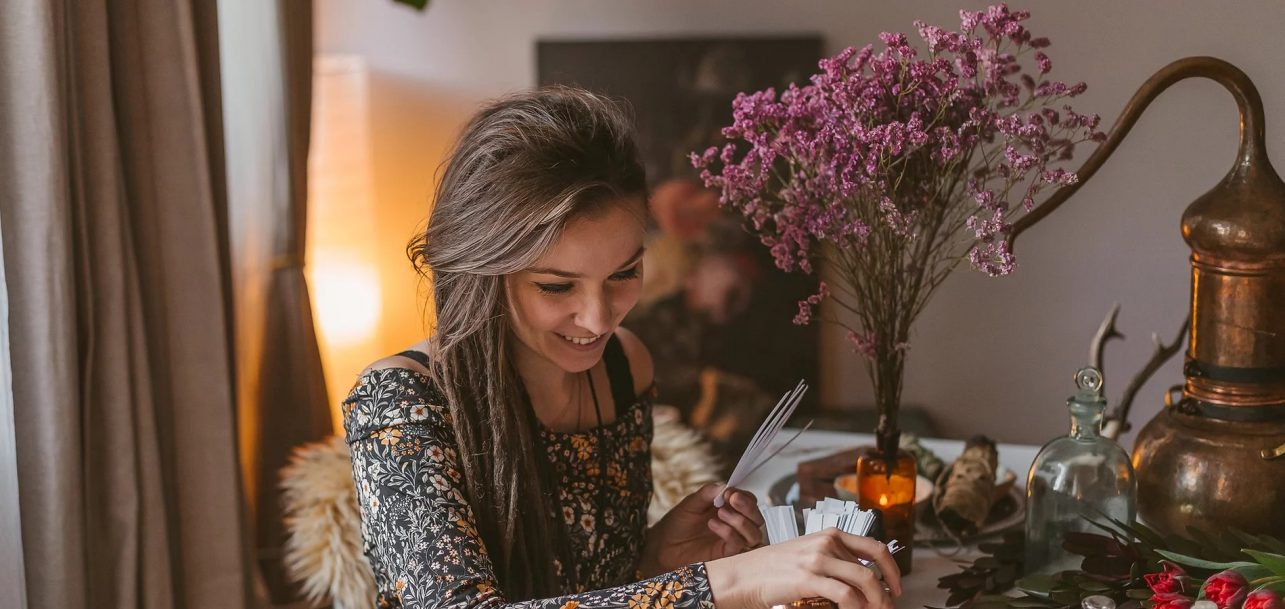
How is perfume born? What is the process of developing it, from the idea to the final product?
First, there is an idea of what the scent will be like, what state it should evoke, what story it will tell, whether it is more of an artistic fragrance, more experiential, illustrative of something meant to be smelled and for people to be immersed in it, more meant to be sprayed daily or perhaps used for meditation. Then the selection and matching of scents takes place. Sometimes it takes a few hours and sometimes a year. If the idea is clear, well felt, and the necessary ingredients on the table, then I observe this miracle as if from the sidelines, when your hands take, compose, and fill the bottles. I only smell the final result and get surprised. Of course, this is how energy perfumes, synergies for meditations are more often born. And in general, it is similar to painting. You smell scents and feel that individually they smell one way, which changes after you combine them, like if you were mixing colors. This is how several fragrance palettes are put together like sketches. Then you need to make a formula, how much of what kind of fragrant substance will be needed, and all that remains is to pour it into a bottle. Then it’s maturation time. Sometimes each accord is matured separately and sometimes together. It takes a long time to observe how the molecules of the scent connect and how everything changes. In some cases, as the perfume matures, it changes significantly and becomes completely different from the day it was made. It is a very beautiful, organic and alchemical process.
in a secret passage near the houses of L. Truikys and M. Rakauskaitė, an old white rose is growing, which is a real blessing to smell.
Most of the perfumes you create are characterized by natural botanical notes, as if emitting maturity, dignity. How did you decide to focus on this particular group of scents?
Strangely, I never liked perfume. At least the kind that takes over the whole space when worn by a person. I am a child of nature and have been since birth and, you could say, that it is not the perfume but the nature and its amazing power to create such an intangible thing as smell, which evokes so many feelings and emotions, that fascinates me. It is also amazing that in addition to an aesthetic value, these scents also have a medicinal and healing value – they are almost magical.
Are there any smells that particularly irritate you, that you try to avoid?
When it comes to perfumes, I don’t like synthetic fragrances. Although as a perfumer I don’t rate fragrances on a like/dislike scale, there are a few scents that stuck with me as the most revolting. These two scents make you want to run and quickly take a shower because they are absorbed by your hair and skin in just a second. These are the smells of potato pudding in sausage skin and a dead mouse that I once found on a farm drowned in a bucket.
Looking at your products, it is obvious that you create not only your own branded fragrances but also custom-made, individual perfumes, aromas for meditation, for raising awareness, introspection and creating neuroassociation. What is the difference between these fragrances and the process of their creation?
I have already mentioned that the perfumes I create have aesthetic and healing potential. When I focus more on aesthetics, creation happens more slowly, it goes through a mental prism, I tend to think more and put together experiences and what reflects what in the aroma. And meditative, neuroassociative synergies are created more from feeling. I myself don’t understand it well enough to explain, it just works. Very simple and at the same time complicated. Personal perfume brings these areas together. I ask the customer a few questions that allow me to know the person better. The questions are not about smells, but about music, colors, dreams, countries, what a person hates, what makes them feel alive and how would they like to feel after applying the perfume. While creating, I listen to a piece of music sent by the customer. It becomes a sort of personal soundtrack. I have always been and am interested in many areas. It used to feel like I am all over the place and cannot find my lane but now, I can use these experiences to sense people better and understand their lives precisely through musical, color and other symbols. To me, life seems like a movie with all these artistic and poetic touches.
What do you focus on the most when creating a personalized perfume for a specific person? What characteristics or interests of an individual are most important in finding the right fragrance for them?
When I read the answered questions, it’s not even the words themselves that matter, but the connection to the person that I make through them. I believe that we are all one, so I sense a person and create for myself as if I were them. If I were to look at it more pragmatically, I could base it on hobbies, personality traits, but then I would only touch the surface, and that produces many similar perfumes. I think people hide their uniqueness and try to fit in. Personalized perfumes become like a footbridge to uniqueness because they are invisible, ephemeral and create the quality of state: to be perfect as you are.
I have no doubt that there is no lack of experimentation in your work, and the taste for perfumes is quite individual. How do you decide that the created aroma is what you or the customer who ordered it wants?
I am glad that the people who come to me are very open. Personally, I take a scent as a journey. I never decide in advance what it should be exactly. When I first inhale the aroma of a new perfume, I wait for the spark to happen. If it does, then you sigh with pleasure and the joy of discovery or pause, listen and observe what triggers it raises; maybe it evokes memories or emotions. If there’s no spark, then I look for what’s missing, fix something, or remake it. Of course, it is important that the smell brings joy, but sometimes you need to feel something inside yourself to make room for that joy. The smell must be in harmony with the scent of a person’s skin and be suitable for the time, place and situation. Harmony is the most important thing.
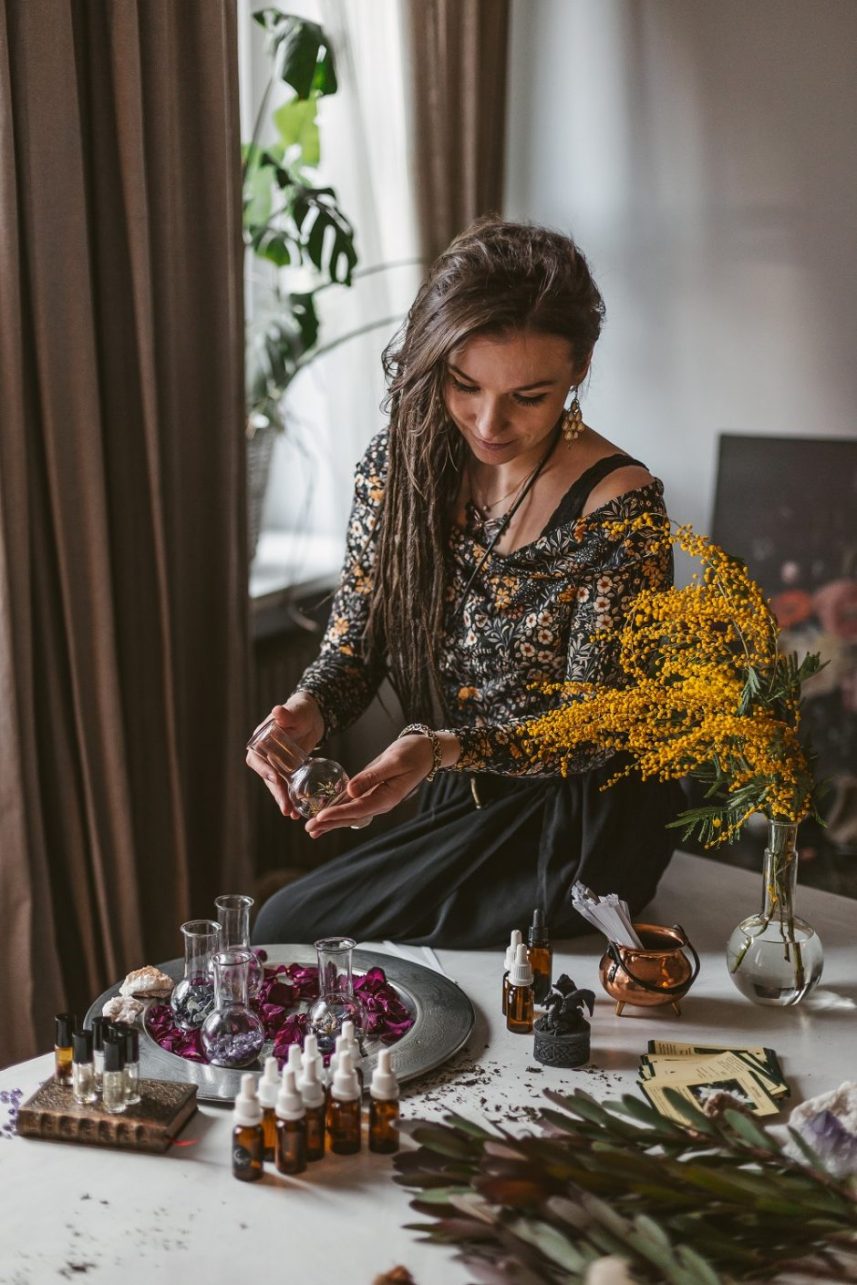
A few years ago, you introduced the spring in Kaunas and Kaunas Art Deco perfumes. How did you come up with this idea?
The idea was born while walking the streets and stairs of Kaunas and observing the wonderful, idyllic and nostalgic art deco architecture. I was very inspired by the A. and P. Galaunė House Museum. When visiting it, I experienced a magical moment. I accidentally took out a book from a bookshelf and it was about plant distillation. I took it as a sign to create a perfume for Kaunas, to make a tribute to Kaunas spirit. Kaunas probably smells completely different now than in my retrospective fantasy about white fluttering curtains in an art deco style apartment and the sounds of jazz brought in by the wind at noon. However, even though there is not a single word about a specific smell throughout the story, there is a smell in the air as you find yourself in this vision.
You were also entrusted to create the scent of the Beast of Kaunas, the mascot of the capital of culture. How did you manage to capture this concept with a physically intangible aroma?
I like to create all kinds of ugly and weird things. The hard part was that the end result kept smelling too good. The plant-based materials just didn’t go together as weirdly as we wanted, so we used animal-based butter CO2 extract. It gave a very interesting and surprising effect.
And what spots in Kaunas have the strongest aroma that you like the most?
I love J. Gruodžio Street on summer evenings, when the most zealous students are still playing and a surreal cacophony of sounds flows through the windows of the conservatory, mixed with the smells of coffee and warm asphalt. V. Putvinskio Street makes me happy in the spring, and I like to take the stairs to Žaliakalnis, when the fragrant pansies start blooming on the slope. And in a secret passage near the houses of L. Truikys and M. Rakauskaitė, an old white rose is growing, which is a real blessing to smell.

